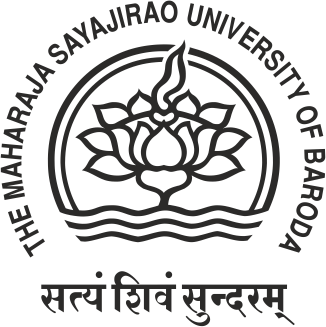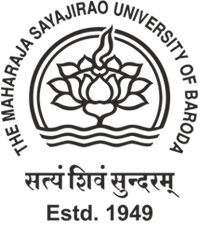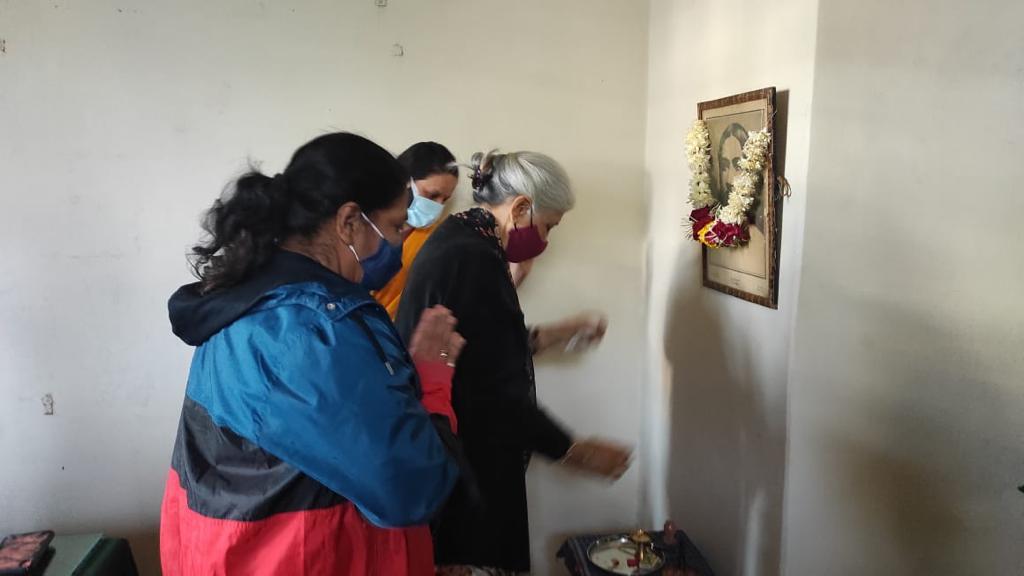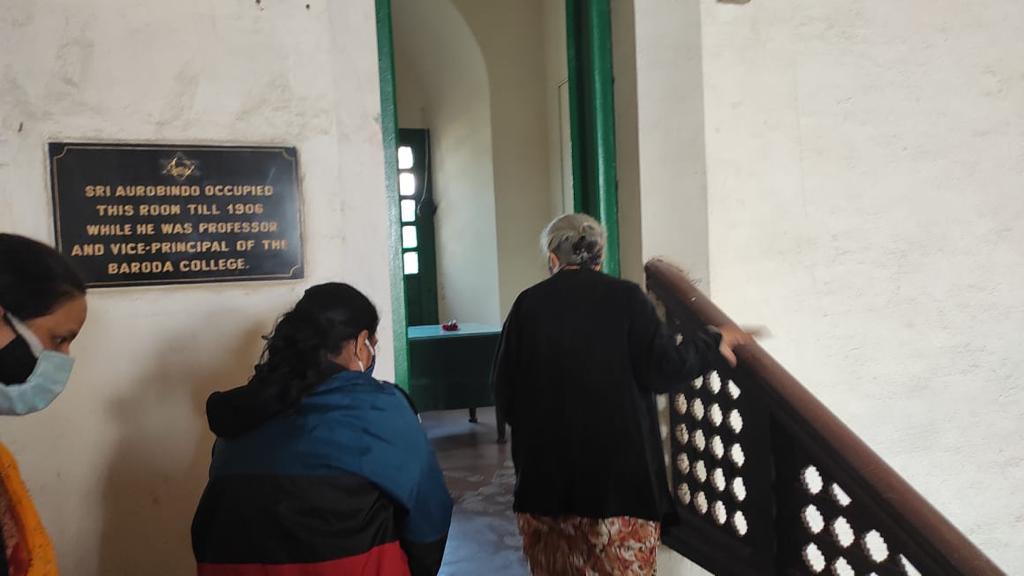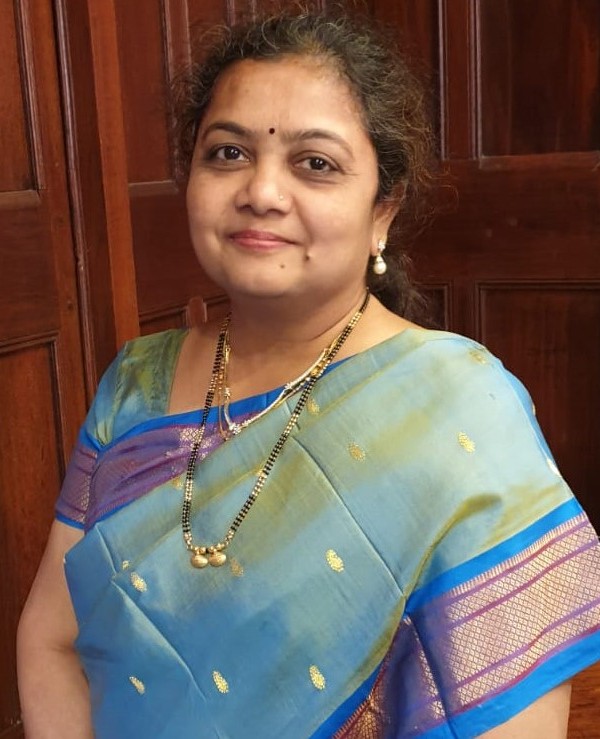Sri Aurobindo Study Centre
Sri Aurobindo Study Centre
Faculty of Arts
The Maharaja Sayajirao University of Baroda, Vadodara
Vision
Integral Development and growth of students through an in-depth study and understanding of life, as a result of the true synthesis of all-encompassing information, the purpose of learning and wisdom, enabling them to attain perfection and transformation into an enlightened being.
Mission
To bring to the students and the staff an opportunity to understand the fundamental principles of Integral Education and yoga in the Light of Sri Aurobindo, the prophet of modern philosophy, the founder of the National Education Concept and alumni of the University.
About
Sri Aurobindo was born in Calcutta on 15th August, 1872. At the age of seven, he was sent for his education to England. Having his primary education, first in an English family at Manchester, and then at St. Pauls’ School, London, he went with a senior scholarship to the Kings College Cambridge. He passed the Tripos in Cambridge in the first class and obtained record marks in Greek and Latin in the examination for the Indian Civil Service.
In 1890 he passed the open competition for the Indian Civil Service, but at the end of two years of probation opted not to present himself at the compulsory riding examination and get disqualified for the Service.
After having mastered all that was precious in ancient Greece and modern Europe, he returned to India in 1893, upon an invitation from the Maharaja Sayajirao Gaekwad. He spent 13 years in Baroda as an administrator in the Baroda State and a Professor of English at the Baorda College. During his stay at Baroda, he made a deep study of India’s culture and spiritual heritage and started literary and political activity. He also learned Sanskrit and several modern Indian languages, assimilated the spirit of Indian civilization and its forms past and present.
In 1906, Sri Aurobinbo went to Bengal and openly took up the leadership of the revolutionary movement. His journal Vande Mataram became the most powerful voice in the freedom movement. The concept of purna swaraj was chiefly introduced and propagated by him. He was detained for one year under trial prisoner for Alipore Conspiracy case in the Alipur jail and was acquitted in May 1909. He continued his addressing the government and the people through his weekly English paper, the Karmayogin, and a Bengali weekly, the Dharma wherein his strong words where enough to create anger to the British government.
However, since his twelve months’ detention in the Alipur Jail, which had been spent entirely in practice of Yoga, his inner spiritual life was pressing upon him for an exclusive concentration.
In February 1910, he withdrew to a secret retirement at Chandannagore and in the beginning of April sailed for Pondicherry in French India. He realized the magnitude of the spiritual work he had taken up and he saw that it would need the exclusive concentration of all his energies and eventually cut off connection with politics, refused repeatedly to accept the President ship of the National Congress and went into a complete retirement. During all his stay at Pondicherry from 1910 onward he remained more and more exclusively devoted to his spiritual work and his sadhana.
In 1926, with the help of the Mother, he founded Sri Aurobindo Ashram and developed a new spiritual path, the Integral Yoga (Purna Yoga), whose ultimate aim is the transformation of life by power of a Supramental Consciousness.
His vision of life is presented in numerous works of prose and poetry, among which the best known are The Life Divine, The Synthesis of Yoga, Savitri, The Foundations of the Indian Culture, The Secrets of the Veda, The essays on Gita, The Human Cycle, The Mother, the Ideal of Human Unity etc.
Sri Aurobindo decided to leave his body on 5th December, 1950 which was laid to the Samadhi after 4 days in the Ashram premises. A constant blue hued light radiating from his body for 4 days was remarkably revealing of his achievement of his sadhana.
The Mother
The Mother, a spiritual successor and a disciple of Sri Aurobindo was born as Mirra Alfassa in Paris on 21st February 1879. An accomplished painter and musician, she began to have spiritual experience at a very early age.
Concerning her early spiritual life, the Mother has said: “Between 11 and 13 a series of psychic and spiritual experiences revealed to me not only the existence of God but man’s possibility of uniting with Him, of realizing Him integrally in consciousness and action, of manifesting Him upon earth in a life divine.” Around 1905 the Mother journeyed to Algeria, where she studied occultism for two years. Returning to Paris in 1906, she started her first group of spiritual seekers.
In 1914 she came to Pondicherry and recognized Sri Aurobindo as her Master (Guru) who for many years had inwardly been guiding her spiritual development. After having gone to France and Japan for some time thereafter, she retutned to Pondicherry on 24th April, 1920 and resumed her spiritual coolaboration with Sri Aurobindo
When on 24th November 1926, Sri Aurobindo withdrew for exclusive pursuit of his spiritual work, the guidance to spiritual disciples was entrusted to the Mother. She was considered not as a disciple but as Sri Aurobindo’s spiritual equal and collaborator. Sri Aurobindo, recognizing her as the embodiment of the Divine Shakti on earth, addressed her as the Mother.
This was the beginning of Sri Aurobindo Asharam, which then developed into a many faceted centre of spiritual community and research. She also established a School, Sri Aurobinbo International Centre of Education in 1952, and an international township, Auroville in 1968.
Till her Samadhi on 17th November 1973, the Mother was engrossed in the ardous tapasya of what she called the ‘yoga of the cells’ – working on the gross matter to divinize and supramentalise it – to discover the path to the supramental being, the next higher stage in the terrestrial evolution, after man.
Coordinator of the Sri Aurobindo Study Centre
Dr. Shaurya Brahmbhatt
Assistant Professor
Department of English
The Maharaja Sayajirao University of Baroda, Vadodara
Email: aurobindocentre@msubaroda.ac.in
Other Links:
The 15th of August 1947 Message by Sri Aurobindo:
[Sri Aurobindo wrote this message at the request of All India Radio, Tiruchirapalli, India, for broadcast on the eve of India’s independence. This is the message which was broadcast on August 14, 1947. It is of special relevance and importance even now.]
August 15th, 1947 is the birthday of free India. It marks for her the end of an old era, the beginning of a new age. But we can also make it by our life and acts as a free nation an important date in a new age opening for the whole world, for the political, social, cultural and spiritual future of humanity.
August 15th is my own birthday and it is naturally gratifying to me that it should have assumed this vast significance. I take this coincidence, not as a fortuitous accident, but as the sanction and seal of the Divine Force that guides my steps on the work with which I began life, the beginning of its full fruition. Indeed, on this day I can watch almost all the world-movements which I hoped to see fulfilled in my lifetime, though then they looked like impracticable dreams, arriving at fruition or on their way to achievement. In all these movements free India may well play a large part and take a leading position.
The first of these dreams was a revolutionary movement which would create a free and united India. India today is free but she has not achieved unity. At one moment it almost seemed as if in the very act of liberation she would fall back into the chaos of separate States which preceded the British conquest. But fortunately it now seems probable that this danger will be averted and a large and powerful, though not yet a complete union will be established. Also, the wisely drastic policy of the Constituent Assembly has made it probable that the problem of the depressed classes will be solved without schism or fissure. But the old communal division into Hindus and Muslims seems now to have hardened into a permanent political division of the country. It is to be hoped that this settled fact will not be accepted as settled for ever or as anything more than a temporary expedient. For if it lasts, India may be seriously weakened, even crippled: civil strife may remain always possible, possible even a new invasion and foreign conquest. India’s internal development and prosperity may be impeded, her position among the nations weakened, her destiny impaired or even frustrated. This must not be; the partition must go. Let us hope that that may come about naturally, by an increasing recognition of the necessity not only of peace and concord but of common action, by the practice of common action and the creation of means for that purpose. In this way unity may finally come about under whatever form—the exact form may have a pragmatic but not a fundamental importance. But by whatever means, in whatever way, the division must go; unity must and will be achieved, for it is necessary for the greatness of India’s future.
Another dream was for the resurgence and liberation of the peoples of Asia and her return to her great role in the progress of human civilisation. Asia has arisen; large parts are now quite free or are at this moment being liberated: its other still subject or partly subject parts are moving through whatever struggles towards freedom. Only a little has to be done and that will be done today or tomorrow. There India has her part to play and has begun to play it with an energy and ability which already indicate the measure of her possibilities and the place she can take in the council of the nations.
The third dream was a world-union forming the outer basis of a fairer, brighter and nobler life for all mankind. That unification of the human world is under way; there is an imperfect initiation organised but struggling against tremendous difficulties. But the momentum is there and it must inevitably increase and conquer. Here too India has begun to play a prominent part and, if she can develop that larger statesmanship which is not limited by the present facts and immediate possibilities but looks into the future and brings it nearer, her presence may make all the difference between a slow and timid and a bold and swift development. A catastrophe may intervene and interrupt or destroy what is being done, but even then the final result is sure. For unification is a necessity of Nature, an inevitable movement. Its necessity for the nations is also clear, for without it the freedom of the small nations may be at any moment in peril and the life even of the large and powerful nations insecure. The unification is therefore to the interests of all, and only human imbecility and stupid selfishness can prevent it; but these cannot stand for ever against the necessity of Nature and the Divine Will. But an outward basis is not enough; there must grow up an international spirit and outlook, international forms and institutions must appear, perhaps such developments as dual or multilateral citizenship, willed interchange or voluntary fusion of cultures. Nationalism will have fulfilled itself and lost its militancy and would no longer find these things incompatible with self-preservation and the integrality of its outlook. A new spirit of oneness will take hold of the human race.
Another dream, the spiritual gift of India to the world has already begun. India’s spirituality is entering Europe and America in an ever increasing measure. That movement will grow; amid the disasters of the time more and more eyes are turning towards her with hope and there is even an increasing resort not only to her teachings, but to her psychic and spiritual practice.
The final dream was a step in evolution which would raise man to a higher and larger consciousness and begin the solution of the problems which have perplexed and vexed him since he first began to think and to dream of individual perfection and a perfect society. This is still a personal hope and an idea, an ideal which has begun to take hold both in India and in the West on forward-looking minds. The difficulties in the way are more formidable than in any other field of endeavour, but difficulties were made to be overcome and if the Supreme Will is there, they will be overcome. Here too, if this evolution is to take place, since it must proceed through a growth of the spirit and the inner consciousness, the initiative can come from India and, although the scope must be universal, the central movement may be hers.
Such is the content which I put into this date of India’s liberation; whether or how far this hope will be justified depends upon the new and free India.
Visitors of the Sri Aurobindo Study Centre
Faculty: Faculty of Arts
Aurobindo Study Center
The Honourable Rajmata Shubhangini Raje Gaekwad, Chancellor of The Maharaja Sayajirao University of Baroda
Event:
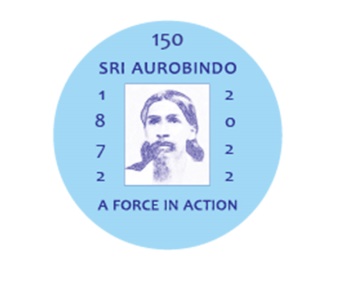
2021-22 is being celebrated as the 150th birth anniversary of Sri Aurobindo. Central Government and state Government have decided to celebrate this historical event significantly. The Maharaja Sayajirao University has also arranged one open lecture on 15th august 2021 on "Revisiting Nation, Nationalism and Culture in the Light of Sri Aurobindo" by Dr. Beloo Mehra, Senior Academic Mentor, AuroBharati, Sri Aurobindo Society, Pondicherry.
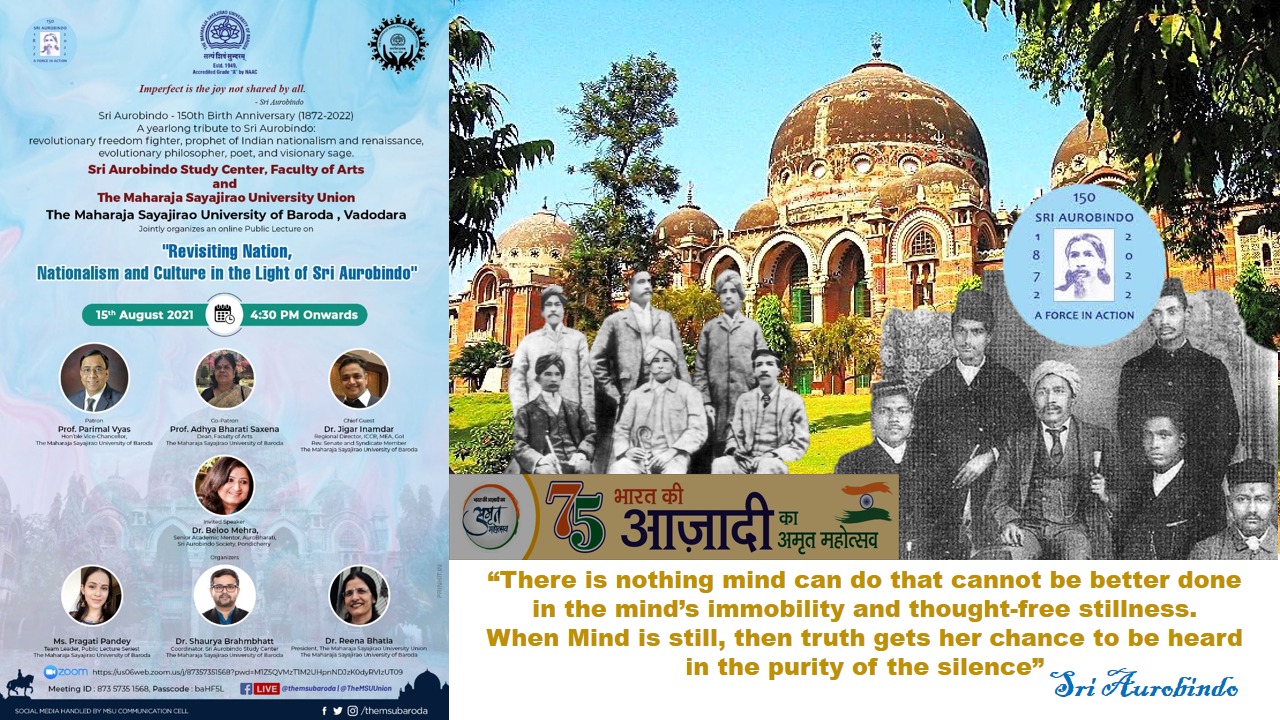 |
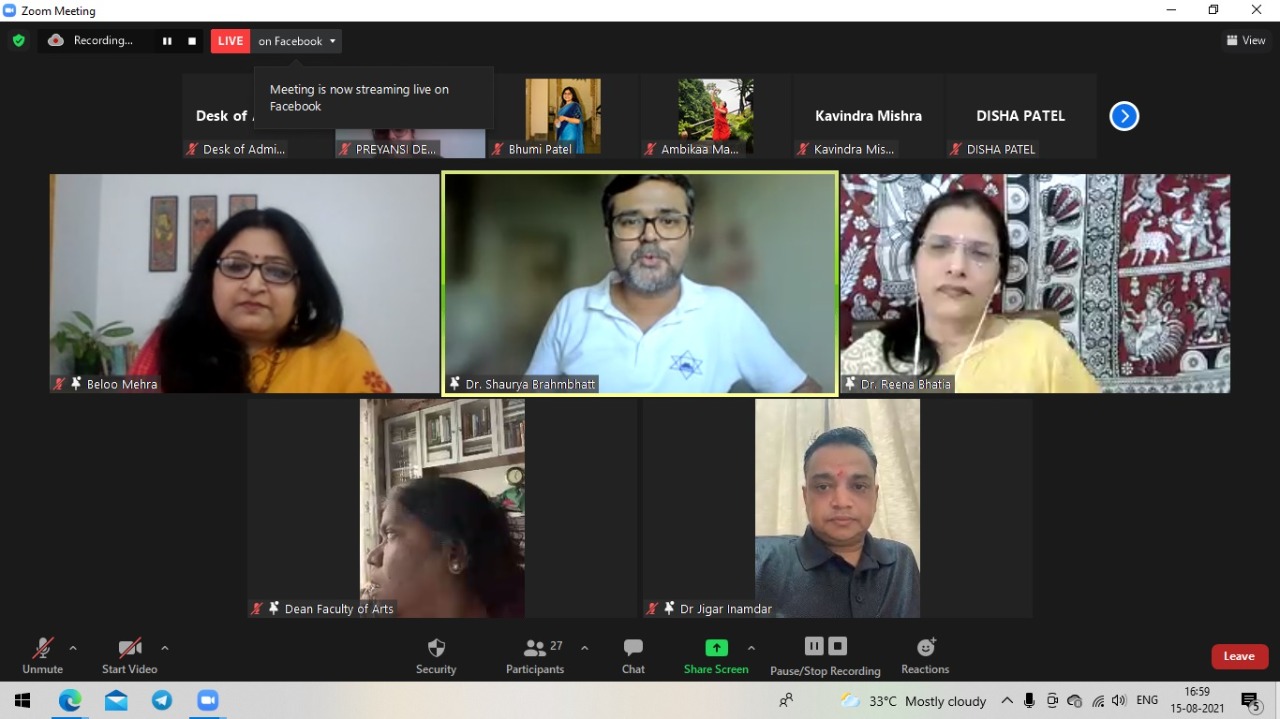 |
Presentation of our centre:
